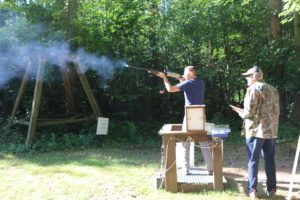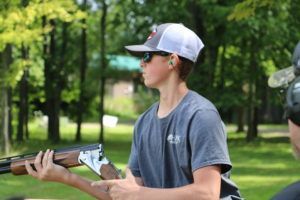Shooters raise money for youth camp, conservation
Almost 100 conservationists shot to make a difference at the annual Michigan Out-of-Doors (MOOD) Youth Camp Charity shoot on Friday.
Each year, the Michigan Out-of-Doors Youth Camp hosts around 400 kids from ages five to 16. Camp curriculum is centered around the outdoors and conservation. Youth complete hunter safety, learn to safely handle firearms and are exposed to a myriad of conservation issues like invasive species and Great Lakes ecosystems.
Aside from donations, the charity shoot is the camp’s largest source of fundraising. Money raised will hel
p to ensure that the facilities at Cedar Lake Outdoor Center are being updated and maintained and that the next generation of conservationists are able to spread the message of conservation to their cohorts.
that the facilities at Cedar Lake Outdoor Center are being updated and maintained and that the next generation of conservationists are able to spread the message of conservation to their cohorts.
Each week, the MOOD Youth Camp features several different camp themes ranging from Hunting Heritage to Wetland Ecology. Campers participating in each curriculum take a deep dive into each program area and learn hands-on skills and how each relates to conservation.
Through the generous donations of the MOOD Youth Camp Charity Shoot sponsors and participants, more than $15,000 was raised.
Here is a list of the shoot’s corporate sponsors:
Jeffress-Dyer Inc.
Ervin Industries
Public Sector Consultants
Michigan Laborers Training and Apprenticeship Institute
Michigan Building and Construction Trades Council
Ducks Unlimited
National Wildlife Federation
Hal & Jean Glassen Memorial Foundation
Michigan Oil and Gas Association
Cygnet Enterprises
Jay’s Sporting Goods
Chelsea Rod and Gun Club
McAlvey Merchant & Associates
Accident Fund Insurance Company
Oakland County Sportsmen’s Club
RFConnect
Without these sponsors, Michigan United Conservation Clubs would not be able to spread the message of conservation to Michigan’s youth. We thank each and every one of our sponsors and all of those who came out to make this year’s shoot one of the best to date.
This year’s top team was the Multi-Lakes Conservation Association team with a score of 163/200. The top gun was Brandon Phelps with a score of 46/50 and the runner-up was Ryan Brookshire with a score of 43/50.
For details on next year’s shoot and how to get involved, stay tuned to mucc.org and the MUCC Faceboook page for more information.
The post Shooters raise money for youth camp, conservation appeared first on Michigan United Conservation Clubs.
Recent Posts



